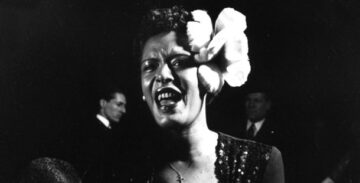Liz Fields on PBS:
 The mesmerizing performance from Academy Award-nominated actress and singer Andra Day in “The United States Vs. Billie Holiday” has revived interest in the hauntingly beautiful and controversial song “Strange Fruit,” which Holiday first popularized in the late 1930s. The film details the numerous ways in which the US government terrorized the singer over her performances of the song right up until her untimely death in 1959, but it does not cover the unusual origins of the song, which was originally written as a poem by a Jewish American teacher from the Bronx, who was also a member of the Communist party.
The mesmerizing performance from Academy Award-nominated actress and singer Andra Day in “The United States Vs. Billie Holiday” has revived interest in the hauntingly beautiful and controversial song “Strange Fruit,” which Holiday first popularized in the late 1930s. The film details the numerous ways in which the US government terrorized the singer over her performances of the song right up until her untimely death in 1959, but it does not cover the unusual origins of the song, which was originally written as a poem by a Jewish American teacher from the Bronx, who was also a member of the Communist party.
Abel Meeropol, a son of Russian Jewish immigrants, taught English at Dewitt Clinton High School in the Bronx for 17 years before turning to music and motion pictures, writing under the pen name Lewis Allan. Meeropol was very disturbed by the persistence of systemic racism in America and was motivated to write the poem “Bitter Fruit” after seeing a photo depicting the lynching of two Black teens in Indiana in 1930. The poem was published in the journal The New York Teacher in 1937, and again later published in the Marxist journal, The New Masses, before Meeropol decided to turn the poem into lyrics and set it to music.
After that, Meeropol began to perform the song at several protest rallies and venues around the city along with his wife and African American singer Laura Duncan. The song first came to Holiday’s attention when she was working at New York’s first integrated nightclub, Café Society in Greenwich Village. Holiday was hesitant at first to sing it because she didn’t want to politicize her performances, and was (rightfully) concerned about being targeted at her performances. But the positive audience responses and frequent requests for “Strange Fruit” soon prompted Holiday to close out every performance with the song. Ahead of time, the waiters would stop serving so there was a deathly silence in the room, then a spotlight would shine on Holiday’s face and she would begin to sing:
“Southern trees bear a strange fruit/ Blood on the leaves and blood at the root/ Black bodies swingin’ in the Southern breeze/ Strange fruit hangin’ from the poplar trees…”
More here. (Note: In honor of Black History Month, at least one post will be devoted to its 2024 theme of “African Americans and the Arts” throughout the month of February)
